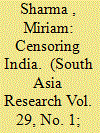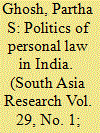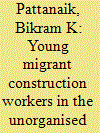| Srl | Item |
| 1 |
ID:
087510


|
|
|
|
|
| Publication |
2009.
|
| Summary/Abstract |
During the early twentieth century, the emerging medium of cinema in British India became a distinctly contested political issue, revealing the tensions and limitations of empire. The record on cinematographic censorship indicates a number of competing interests and changing views, while political transformations and messy realities on the ground defied the efficacy of censorship. Even as many Indian filmmakers sought to convey messages of nationalist aspirations, the perceived need to guard against the revolutionary thoughts of communism and ideas from America that seemed to promote democracy and promiscuity fuelled censorship as a major multivocal imperial policy. Beset by many obstacles, it sought to control the exhibition of both Indian and foreign cinematic productions.
The article seeks to understand the genealogy of censorship derived from prior British attempts to regulate literary and dramatic productions. In the 1920s, anxieties about the maintenance of law and order and protection of British rule during a period of increasing Indian nationalist unrest had to be integrated with various concerns about deteriorating economic conditions. As Indian cinema struggled to come into its own, the issue of control became a central concern for both coloniser and colonised, while both faced threats from the influx of foreign (especially Hollywood) films.
The article also explores why it was deemed so important to bring cinema under the colonial gaze. While there was no unified front on how to deal with this new medium, it was perceived as highly in-fluential, with great potential for harmful or beneficial propaganda impacts. Finally, considerations of the competing demands of moral concerns were juxtaposed to the growing economic needs of the Indian film industry.
Throughout, it transpires from archival research how defining policy issues became ever more critical and how the complexities of implementation were made more difficult by the 'global' nature of policy formation as opposed to the more 'local' nature of the performance of control.
|
|
|
|
|
|
|
|
|
|
|
|
|
|
|
|
| 2 |
ID:
087508


|
|
|
|
|
| Publication |
2009.
|
| Summary/Abstract |
Focusing explicitly on a political science perspective, this article argues that the inter-communal politics of personal law debates in India can be seen as a politically navigated form of identity construction. Specifically the Hindu-Muslim debates demonstrate that today, such contested matters of identity are not merely debated within national boundaries but have also taken on global dimensions which need to be accounted for. Inter-communal politics evidently have important implications for electoral politics, but manipulations of personal laws run the risk of making bad politics.
|
|
|
|
|
|
|
|
|
|
|
|
|
|
|
|
| 3 |
ID:
087509


|
|
|
|
|
| Publication |
2009.
|
| Summary/Abstract |
This article constitutes an empirical socio-economic analysis based on a field study involving 1200 young unorganised workers found in the construction sector of the so-called tri-city of Chandigarh, Panchkula and Mohali. The main aim of the study was to examine the reasons why and how these young people had come to work in this urban environment, how they live and spend their money and what they perceive as their major problems. Based on the findings, the article argues that Indian policy makers, with specific regard to the urban unorganised labour sector, should take more-adequate measures for the protection of human rights of such migrant workers.
|
|
|
|
|
|
|
|
|
|
|
|
|
|
|
|